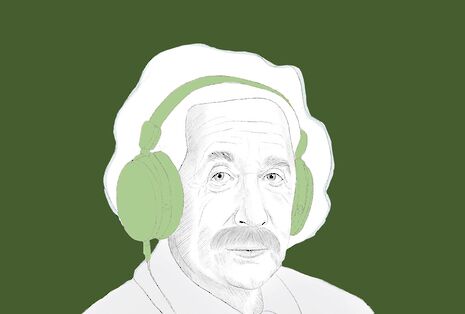Seeing the universe through sound
Grace Field explores the influence of classical music on Einstein’s scientific theories

Einstein loved music, and made no secret of it. He played the violin throughout his life, and talked about music in interviews, letters and self-reflections. He even said, in a 1929 interview: “If I were not a physicist, I would probably be a musician. I often think in music. I live my daydreams in music. I see my life in terms of music.” His son Hans reminisced, “Whenever he felt that he had come to the end of the road or into a difficult situation in his work he would take refuge in music that would usually resolve all his difficulties.”
He began playing the violin when he was only five years old, encouraged by his piano-playing mother. But he hated the lessons at first, until he discovered Mozart’s violin sonatas as a teenager. Mozart, and his violin, then became companions for life.
But what did music really mean to Einstein, and how did his music affect his science, if at all? These questions are only just beginning to be paid scholarly attention. Leon Botstein, a conductor and music historian, has gone so far as to suggest that Einstein’s music may have influenced his science – in particular, that the aesthetic principles underlying Einstein’s scientific work may have been grounded in musical aesthetic principles.
“Einstein applied similar aesthetic criteria to music and science”
Einstein does seem to have valued clarity, simplicity and structuredness in music – aesthetic virtues that he is also known to have valued in scientific theories. He loved Mozart, the archetype of melodic and structural clarity, and objected to more modern composers like Debussy and Wagner based on the “lack of architectural structure” in their work.
At the same time, Einstein objected to modern scientific theories like quantum mechanics based on their lack of deterministic structure. Although the macroscopic world behaves deterministically – as in, if we know the laws governing a physical system, and the system’s current state, then we can predict what the system will look like at any time in the future – quantum mechanics seems to tell us that the microscopic world behaves indeterministically. When we go to small enough length scales, full knowledge of the physical laws, combined with full knowledge of a system’s current state, does not seem to be enough to tell us what the system will look like in the future. Einstein objected to quantum mechanics because its indeterministic nature did not match the inherent clarity, simplicity and structuredness that he believed should govern the universe.
Botstein therefore suggests, considering Einstein’s discovery of his love of Mozart came at age 13, before he started seriously studying science, that the aesthetic principles underlying Einstein’s scientific work may have been influenced and reinforced, or even formed, by musical tastes developed in his childhood. He posits that Einstein’s belief in the clarity, simplicity and structuredness of the universe may have been motivated by his childhood love of Mozart.
Since Einstein does seem to have applied similar aesthetic criteria to music and science, and since music has, for so long, been associated with the structure of the cosmos, Botstein’s suggestion is alluring. Ever since the ancients cast the universe’s structure in terms of the music of the celestial spheres, musical thinking has influenced science – Oresme, Kepler, and Thomas Young are just a few from a long list of scientists who allowed musical principles to influence their scientific work. It would be satisfying to be able to add Einstein to the list.
 News / Cambridge academics stand out in King’s 2026 Honours List2 January 2026
News / Cambridge academics stand out in King’s 2026 Honours List2 January 2026 Comment / Plastic pubs: the problem with Cambridge alehouses 5 January 2026
Comment / Plastic pubs: the problem with Cambridge alehouses 5 January 2026 News / Cambridge businesses concerned infrastructure delays will hurt growth5 January 2026
News / Cambridge businesses concerned infrastructure delays will hurt growth5 January 2026 News / AstraZeneca sues for £32 million over faulty construction at Cambridge Campus31 December 2025
News / AstraZeneca sues for £32 million over faulty construction at Cambridge Campus31 December 2025 Interviews / You don’t need to peak at Cambridge, says Robin Harding31 December 2025
Interviews / You don’t need to peak at Cambridge, says Robin Harding31 December 2025









